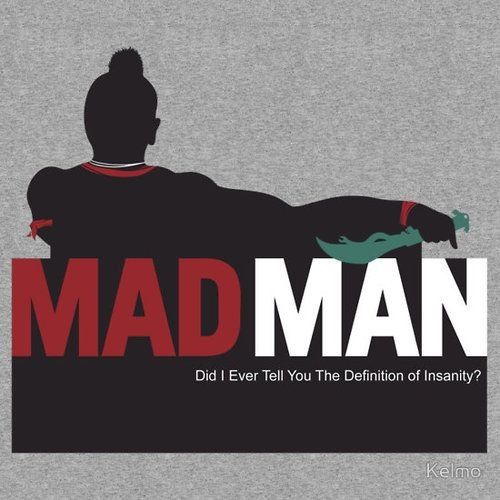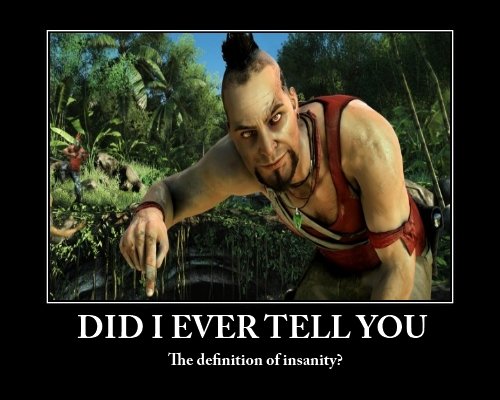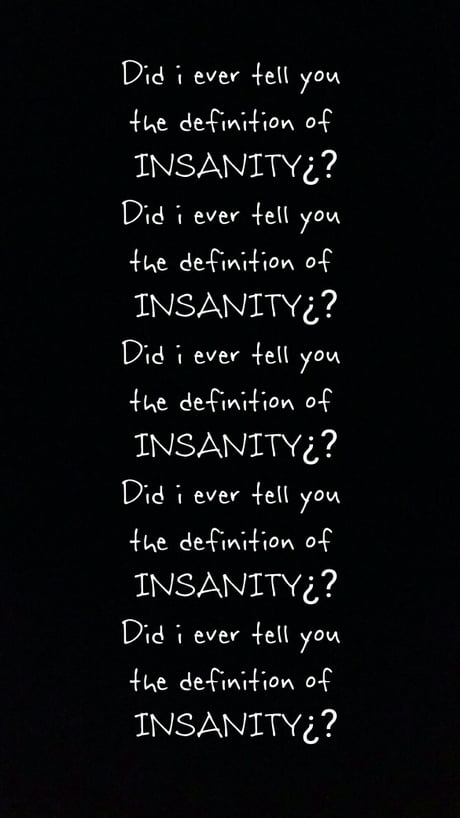Who said the definition of insanity
Misattributed Quotes
AP PhotoWe've all heard Albert Einstein's famous line: "Insanity is doing the same thing over and over again and expecting different results."
As it turns out, insanity might be crediting that quote to Einstein over and over again. He never said it.
Misattributions like this happen pretty often. One person quotes someone else without a shoutout, and all of a sudden, they become the original speaker. Or we just decide a quote sounds like something Mark Twain would say.
These 12 surprising examples are credited to people who never really said them.
1. "Let them eat cake." — not Marie Antoinette
Not only did Marie Antoinette not utter these words, if she had, everyone probably misunderstood her.
In Jean-Jacques Rousseau's "Book 6" of his 12-volume autobiographical work, "Confessions," he writes, "At length I recollected the thoughtless saying of a great princess, who, on being informed that the countrypeople had no bread, replied, "Then let them eat pastry!" according to Phrase Finder.
Most people assume "great princess" refers to Marie Antoinette. But Rousseau wrote those words in 1767 — when Marie Antoinette was 12 years old. She also didn't marry Louis XVI until 1770.
Even if Marie Antoinette did utter the phrase, the original version in French, "Qu'ils mangent de la brioche," means "Let them eat brioche" — a type of crumbly French pastry (not unlike cake but not totally the same) eaten by the upperclass. The misinterpreted quote portrays Marie Antoinette as a callous patrician, unconcerned with the plight of the poor. But she could have meant the wealthy should stop monopolizing food and share with the lower classes — if she said it.
Other sources credit Marie-Therese, Marie Antoinette's eldest child (and the wife of Louis XIV).
2. "I disapprove of what you say, but I will defend to the death your right to say it." — not Voltaire
Voltaire didn't actually speak these words, but the idea does fall in line with his ideology.
In her well-known biography of the French philosopher, "Friends of Voltaire," Evelyn Beatrice Hall writes, "'I disapprove of what you say, but I will defend to the death your right to say it,' was his attitude now."
The author was paraphrasing how she thought Voltaire felt about a certain topic. Everyone just decided the quote was real.
3. "Standing on the shoulders of giants" — not Sir Isaac Newton
Perhaps the most well-known phrase attributed to Sir Isaac Newton, these words appeared in a letter Newton wrote to Robert Hooke, another English philosopher and mathematician. But Newton didn't coin the phrase himself. He was alluding to a simile said much earlier by Bernard of Chartres, a 12th-century man.
John of Salisbury wrote that Bernard of Chartres used to say that "we [the Moderns] are like dwarves perched on the shoulders of giants [the Ancients], and thus we are able to see more and farther than the latter."
4. "Our deepest fear is not that we are inadequate. Our deepest fear is that we are powerful beyond measure." — not Nelson Mandela
This fanciful excerpt from the former South African president's 1994 inaugural address has floated around the Internet for years. The passage goes on:
It is our light, not our darkness that most frightens us. We ask ourselves, who am I to be brilliant, gorgeous, talented, fabulous? Actually, who are you not to be? You are a child of God. Your playing small does not serve the world ... As we are liberated from our own fear, our presence automatically liberates others.
But crediting Mandela for these words right after getting out of prison seems downright ridiculous. Brian Morton puts it best in The New York Times:
"Picture it: Mr. Mandela, newly free after 27 years in prison, using his inaugural platform to inform us that we all have the right to be gorgeous, talented and fabulous, and that thinking so will liberate others," Morton writes.
Mandela, newly free after 27 years in prison, using his inaugural platform to inform us that we all have the right to be gorgeous, talented and fabulous, and that thinking so will liberate others," Morton writes.
In reality, self-help guru Marianne Williamson wrote these words in her 1989 spiritual best-seller, "A Return To Love." The front page of her website even boasts about the excerpt.
5. "Age is an issue of mind over matter. If you don’t mind, it doesn’t matter." — not Mark Twain/Jack Benny/Muhammad Ali
People throw this quote around all the time, accompanied by arbitrary attributions. With a little help from Quote Investigator, the problem becomes clear: No one knows who said it. The first reference found comes from an anonymous government researcher in 1968. "Aging is a matter of mind. If you don’t mind, it doesn’t matter."
Since then, the quote morphed to include "mind over matter." Comedian Jack Benny said it on his 80th birthday. A South Carolina newspaper credited Twain in 1970. And in 1981, Muhammad Ali flipped the phrase at a journalist while preparing for his last fight.
A South Carolina newspaper credited Twain in 1970. And in 1981, Muhammad Ali flipped the phrase at a journalist while preparing for his last fight.
6. “Be who you are and say what you feel because those who mind don’t matter, and those who matter don’t mind.” — not Dr. Seuss
QI also debunked this famous misconception. We'd like to think Theodor Seuss Geisel, better known as Dr. Seuss, would wholly support the concept, but the reality feels a little more depressing: No evidence of the phrase exists in any of his books, and a snarky engineer coined the original.
The quote first appeared in 1938 in a London journal for municipal and county engineers. An ambiguous "Mr. Davies" directed the words toward people who criticized his housing designs.
The phrase morphed into advice about seating arrangements and a poem used in The Wall Street Journal. Dr. Seuss didn't come into play until the 2000s, mostly in high school yearbooks.
7. "Well-behaved women rarely make history." — not Marilyn Monroe
In 2007, Laurel Thatcher Ulrich, a celebrated female historian, wrote a book titled, "Well-Behaved Women Rarely Make History." Some suspect she swiped the title of her best-seller from the 1950s' favorite buxom blonde: Marilyn Monroe.
But they're wrong. Ulrich first wrote the phrase in 1976 for an issue of "American Quarterly," according to The New York Times. The original version refers to colonial woman in a very literal way. We know almost nothing about well-behaved, quiet women from that time period.
8. "There's a sucker born every minute." — not P.T. Barnum
One of Barnum's biggest competitors and critics actually said this, according to "P.T. Barnum: The Legend And The Man," a biography by A.H. Saxon.
In a 1948 article in the "Bridgeport Post," the anonymous author asked Adam Forepaugh if he could quote him on the "sucker" statement.
"Just say it's one of Barnum's slogans which I am borrowing for the occasion. It sounds more like him than it does me anyway," Forepaugh replied.
Barnum did, however, say, "The people like to be humbugged," which somehow doesn't seem as rude.
9. "If you have to ask how much they are, you can't afford one." — not J.P. Morgan
No evidence exists that Morgan actually spoke these words, typically referenced as his response to an inquiry about the price of his lavish yachts. Biographer Jean Strouse doesn't think the quote fits Morgan's language style either, according to the The Quote Verifier.
Strouse did, however, stumble upon a recording of Morgan's response to Henry Clay Pierce's question about his yacht's price. "You have no right to own a yacht if you ask that question," he said. Different words. Still uppity.
10."If you're not a liberal when you're 25, you have no heart. If you're not a conservative by the time you're 35, you have no brain. " — not Winston Churchill
" — not Winston Churchill
Churchill never said this, according to the Churchill Centre and Museum in London. In fact, Paul Addison of Edinburgh University mentions this: "Surely Churchill can't have used the words attributed to him. He'd been a Conservative at 15 and a Liberal at 35! And would he have talked so disrespectfully of Clemmie, who is generally thought to have been a lifelong Liberal?"
Instead, Francois Guizot coined the phrase in the 19th century. "Not to be a republican at 20 is proof of want of heart; to be one at 30 is proof of want of head."
11. "The ends justify the means." — not Niccolo Machiavelli
In "Heroides II," the Roman poet Ovid writes, "Exitus acta probat," which translates as "the outcome justifies the means." The closest Machiavelli comes to this idea, according to the Christian Science Monitor, occurs in "The Prince." He argues that people will always consider a prince's means as honest and praise him.
Considering he dedicated the book to the Medici family, who later arrested and tortured him, Machiavelli may have written the entire book satirically.
12. "Insanity is doing the same thing over and over again and expecting different results." — not Albert Einstein
Different versions of this quote appear everywhere (doing the same thing twice, expecting the same result, etc.), and we owe none of them to Einstein.
After Michael Becker, an editor at the Bozeman Daily Chronicle (a local paper in Montana), let the wrong version slide into an editorial, he did some research on his personal blog.
Becker traced the original back to Rita Mae Brown, the mystery novelist. In her 1983 book "Sudden Death," she attributes the quote to a fictional "Jane Fulton," writing, "Unfortunately, Susan didn’t remember what Jane Fulton once said. 'Insanity is doing the same thing over and over again, but expecting different results.'"
Now, go throw away half your coffee mugs and inspirational posters.
Einstein's Parable of Quantum Insanity
Share on Facebook
Share on Twitter
Share on Reddit
Share on LinkedIn
Share via Email
Print
From Quanta Magazine (find original story here).
“Insanity is doing the same thing over and over and expecting different results.”
That witticism—I’ll call it “Einstein Insanity”—is usually attributed to Albert Einstein. Though the Matthew effect may be operating here, it is undeniably the sort of clever, memorable one-liner that Einstein often tossed off. And I’m happy to give him the credit, because doing so takes us in interesting directions.
First of all, note that what Einstein describes as insanity is, according to quantum theory, the way the world actually works. In quantum mechanics you can do the same thing many times and get different results. Indeed, that is the premise underlying great high-energy particle colliders. In those colliders, physicists bash together the same particles in precisely the same way, trillions upon trillions of times. Are they all insane to do so? It would seem they are not, since they have garnered a stupendous variety of results.
Indeed, that is the premise underlying great high-energy particle colliders. In those colliders, physicists bash together the same particles in precisely the same way, trillions upon trillions of times. Are they all insane to do so? It would seem they are not, since they have garnered a stupendous variety of results.
Of course Einstein, famously, did not believe in the inherent unpredictability of the world, saying “God does not play dice.” Yet in playing dice, we act out Einstein Insanity: We do the same thing over and over—namely, roll the dice—and we correctly anticipate different results. Is it really insane to play dice? If so, it’s a very common form of madness!
We can evade the diagnosis by arguing that in practice one never throws the dice in precisely the same way. Very small changes in the initial conditions can alter the results. The underlying idea here is that in situations where we can’t predict precisely what’s going to happen next, it’s because there are aspects of the current situation that we haven’t taken into account. Similar pleas of ignorance can defend many other applications of probability from the accusation of Einstein Insanity to which they are all exposed. If we did have full access to reality, according to this argument, the results of our actions would never be in doubt.
Similar pleas of ignorance can defend many other applications of probability from the accusation of Einstein Insanity to which they are all exposed. If we did have full access to reality, according to this argument, the results of our actions would never be in doubt.
This doctrine, known as determinism, was advocated passionately by the philosopher Baruch Spinoza, whom Einstein considered a great hero. But for a better perspective, we need to venture even further back in history.
Parmenides was an influential ancient Greek philosopher, admired by Plato (who refers to “father Parmenides” in his dialogue the Sophist). Parmenides advocated the puzzling view that reality is unchanging and indivisible and that all movement is an illusion. Zeno, a student of Parmenides, devised four famous paradoxes to illustrate the logical difficulties in the very concept of motion. Translated into modern terms, Zeno’s arrow paradox runs as follows:
- If you know where an arrow is, you know everything about its physical state.

- Therefore a (hypothetically) moving arrow has the same physical state as a stationary arrow in the same position.
- The current physical state of an arrow determines its future physical state. This is Einstein Sanity—the denial of Einstein Insanity.
- Therefore a (hypothetically) moving arrow and a stationary arrow have the same future physical state.
- The arrow does not move.
Followers of Parmenides worked themselves into logical knots and mystic raptures over the rather blatant contradiction between point five and everyday experience.
The foundational achievement of classical mechanics is to establish that the first point is faulty. It is fruitful, in that framework, to allow a broader concept of the character of physical reality. To know the state of a system of particles, one must know not only their positions, but also their velocities and their masses. Armed with that information, classical mechanics predicts the system’s future evolution completely. Classical mechanics, given its broader concept of physical reality, is the very model of Einstein Sanity.
Classical mechanics, given its broader concept of physical reality, is the very model of Einstein Sanity.
With that triumph in mind, let us return to the apparent Einstein Insanity of quantum physics. Might that difficulty likewise hint at an inadequate concept of the state of the world?
Einstein himself thought so. He believed that there must exist hidden aspects of reality, not yet recognized within the conventional formulation of quantum theory, which would restore Einstein Sanity. In this view it is not so much that God does not play dice, but that the game he’s playing does not differ fundamentally from classical dice. It appears random, but that’s only because of our ignorance of certain “hidden variables.” Roughly: “God plays dice, but he’s rigged the game.”
But as the predictions of conventional quantum theory, free of hidden variables, have gone from triumph to triumph, the wiggle room where one might accommodate such variables has become small and uncomfortable. In 1964, the physicist John Bell identified certain constraints that must apply to any physical theory that is both local—meaning that physical influences don’t travel faster than light—and realistic, meaning that the physical properties of a system exist prior to measurement. But decades of experimental tests, including a “loophole-free” test published on the scientific preprint site arxiv.org last month, show that the world we live in evades those constraints.
In 1964, the physicist John Bell identified certain constraints that must apply to any physical theory that is both local—meaning that physical influences don’t travel faster than light—and realistic, meaning that the physical properties of a system exist prior to measurement. But decades of experimental tests, including a “loophole-free” test published on the scientific preprint site arxiv.org last month, show that the world we live in evades those constraints.
Ironically, conventional quantum mechanics itself involves a vast expansion of physical reality, which may be enough to avoid Einstein Insanity. The equations of quantum dynamics allow physicists to predict the future values of the wave function, given its present value. According to the Schrödinger equation, the wave function evolves in a completely predictable way. But in practice we never have access to the full wave function, either at present or in the future, so this “predictability” is unattainable. If the wave function provides the ultimate description of reality—a controversial issue!—we must conclude that “God plays a deep yet strictly rule-based game, which looks like dice to us. ”
”
Einstein’s great friend and intellectual sparring partner Niels Bohr had a nuanced view of truth. Whereas according to Bohr, the opposite of a simple truth is a falsehood, the opposite of a deep truth is another deep truth. In that spirit, let us introduce the concept of a deep falsehood, whose opposite is likewise a deep falsehood. It seems fitting to conclude this essay with an epigram that, paired with the one we started with, gives a nice example:
“Naïveté is doing the same thing over and over, and always expecting the same result.”
Frank Wilczek was awarded the 2004 Nobel Prize in physics for his work on the theory of the strong force. His most recent book is A Beautiful Question: Finding Nature’s Deep Design. Wilczek is the Herman Feshbach Professor of Physics at the Massachusetts Institute of Technology.
Reprinted with permission from Quanta Magazine, an editorially independent publication of the Simons Foundation whose mission is to enhance public understanding of science by covering research developments and trends in mathematics and the physical and life sciences.
ABOUT THE AUTHOR(S)
Frank Wilczek is the Herman Feshbach Professor of Physics at the Massachusetts Institute of Technology. He won the Nobel Prize in Physics in 2004 for his work on the theory of the strong force. Credit: Nick Higgins
Do you know what madness is? Iconic video game quotes
Giorgi Gabriadze
July 14, 2020 09:15
Photo: © Ubisoft Entertainment
Be careful, spoilers are possible.
Carefully, spoilers are possible.
Video game characters gave the world a lot of catchphrases, lines and monologues, which were taken apart into quotes and jokes. And sometimes one good line can succinctly explain the whole meaning of what is happening in the game. In this collection, we will talk about some of them.
Witcher III Wild Hunt
Move Roach!
Photo: © CD PROJEKT S. A.
A.
During all the time of his adventures, the witcher Geralt changed far from one horse, and each, regardless of gender, became a Roach. Geralt calls his horse with a whistle, and it instantly appears next to him, even if she stayed in another city. And when sitting in the saddle, the witcher always says: “Move, Roach!”.
Watch on YouTube
Teleportation from one location to another and the love of the gray-headed witcher for the name Roach gave rise to a bunch of funny pictures with this quote among fans.
Hotline Miami
"Do you enjoy hurting others?"
In the course of the story, in dreams or delirium, a mysterious man in a rooster mask named Richard comes to the heroes and at first glance speaks incoherent nonsense. In fact, Richard's speeches are directly related to the plot.
Watch on YouTube
In one of his monologues, the rooster asks: "Do you like hurting people?" Due to the overall atmosphere of the game and Richard's charismatic mystique, the quote has added to the list of catch phrases from Hotline Miami that players remember even years after its release.
Metal Gear Solid
Snake! Snake? Snaaaaaaake!"
In Hideo Kojima's spy thriller, the protagonist communicates with his assistant via a walkie-talkie. If the character dies, then on the screen of the end of the game, the ally on the walkie-talkie screams his name in a very emotional way.
Watch on YouTube
The players liked his intonation so much that they began to make various funny videos with this cry.
Mafia: The City of Lost Heaven
Thomas Angelo Monologue
The first Mafia is inspired by the legendary gangster films The Godfather and The Goodfellas. The project of the 2K Czech studio gives players colorful and memorable characters, an interesting story and well-written dialogues.
Watch on YouTube
The final speech of the protagonist, Thomas Angelo, is especially memorable: “You know, I think that one should know the measure in everything. Yes, measure, that's a good word. Anyone who wants too much runs the risk of losing absolutely everything. True, whoever wants too little from life may not get anything at all ... ". It beautifully sums up the whole path passed by the character.
Yes, measure, that's a good word. Anyone who wants too much runs the risk of losing absolutely everything. True, whoever wants too little from life may not get anything at all ... ". It beautifully sums up the whole path passed by the character.
Far Cry 3
"Have I told you what madness is?"
The villain of the third part of Far Cry turned out to be very charismatic and immediately fell in love with the players. In one of the scenes, Vaas Montenegro is talking to the connected protagonist, talking in his trademark manner about madness.
“Have I already told you what madness is? Madness is the exact repetition of the same action over and over again in the hope of a change. This. Eat. Madness". After the release of the game, the quote was found all over the Internet and even now it is used as a joke or reference.
Bioshock
Be Kind
Bioshock is a game with philosophical overtones. In the ending, it turns out that the protagonist is the son of another important plot character, Andrew Ryan, a utopian who built the underwater city Rapture.
Watch on YouTube
The phrase "be kind" controls the hero, depriving him of free will. Ryan's last words convey the main idea of the whole story: "Man chooses, slave obeys."
Fallout
“War. War never changes.”
Quote from the introductory video for the Fallout games. It implies that the methods and methods of warfare may change, but not its very essence. War always brings death and destruction.
Watch on YouTube
“War. War never changes" is one of the most famous video game expressions. It seems to tell the user: even after the nuclear apocalypse, everything remains as before.
See also:
- They break mice and gamepads. Compilation of games with high difficulty
- Blast from the past. Worms are back
- Nations Cup, World Championship. How esports works in PUBG
- How esports broadcasts are created. Interview with RuHub General Producer
- Plague escape, bank robbery, Alien hunting.
 What are masks for in video games
What are masks for in video games
* A social network recognized as extremist in Russia
No connection
I didn't say that: 5 fake quotes attributed to famous people
Trending
How often do we believe the authorship of quotes written on the Internet. Often such words this person did not even think to say. Find out what is true and what is fiction.
“Insanity is the exact repetition of the same action. Time after time, in the hope of change. This is madness”
Attributed to: Albert Einstein
Actually: This quote, taken as if from the mouth of a maniac from a thriller, was attributed to Benjamin Franklin, Mark Twain and Albert Einstein. Most often on the Internet, a quote is signed with the name of the latter.
But initially the phrase was never associated with the mentally ill. The first version was written in a book by Narcotics Anonymous and was intended to help people in rehab: "Insanity is repeating the same mistakes over and over expecting different results. " This is a turn, right?
" This is a turn, right?
- photo
- Giphy.com
“Elementary, Watson”
to be attributed: Sherlock Holmes, Hero Arthur Dodule
The most famous fraud, with which the most famous fraud is holy. Sherlock Holmes, was never pronounced sleuth in the books. The quote was first used in P. G. Wodehouse's novel Psmith the Journalist and was not associated with the detective. The hero used it in an ironic context, grinning at someone else's narrow-mindedness.
The phrase was first heard in cinema in 1929, in the British film adaptation of The Return of Sherlock Holmes.
- photo
- Giphy.com
“Decent women rarely make history”
to be attributed: Marilyn Monroe
In fact: , legendary actress? So, the words belong to a completely different person. In 1976, historian and professor Laurel Thatcher Ulrich published an essay in a scientific journal - from there the quote floated "to the people" and into popular culture. 9Ol000 . The writer, in turn, simply translated a phrase spoken in the 19th century by French commissioner Joseph Le Bon in response to a request for pardon for an aristocrat. Allegedly, this man was smart, strong and could be useful to the republic - but, as you know, there are many such people in the world.
In 1976, historian and professor Laurel Thatcher Ulrich published an essay in a scientific journal - from there the quote floated "to the people" and into popular culture. 9Ol000 . The writer, in turn, simply translated a phrase spoken in the 19th century by French commissioner Joseph Le Bon in response to a request for pardon for an aristocrat. Allegedly, this man was smart, strong and could be useful to the republic - but, as you know, there are many such people in the world.
- Photo
- giphy.com
“If I fall asleep and wake up in a hundred years and they ask me what is happening in Russia now, I will answer without hesitation: they drink and steal”
Attributed to : Mikhail Saltykov-Shchedrin
Actually: Words are often given as an epigraph in articles or in VKontakte statuses, but the Russian writer himself did not write or say anything like that.














